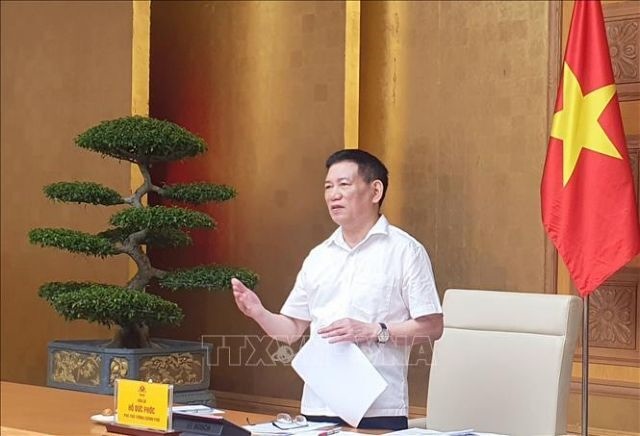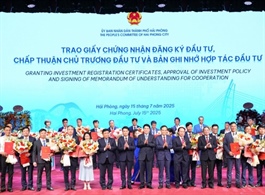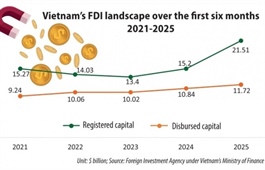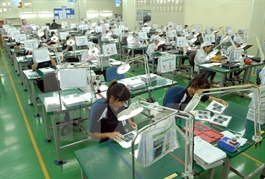Deputy PM urges advance of State-owned enterprise autonomy
Deputy PM urges advance of State-owned enterprise autonomy
Deputy Prime Minister Hồ Đức Phớc said the new law marks a breakthrough in managing State capital and advancing enterprise autonomy.
 |
Deputy Prime Minister Hồ Đức Phớc, head of the Steering Committee for Enterprise Reform and Development, chaired a meeting with the Ministry of Finance and major State-owned enterprises (SOEs) yesterday focused on reviewing three draft decrees on State capital management that he said will increase the firms' autonomy.
New rights granted to SOEs under the draft law include managing business operations and determining salaries and promotions, according to the Deputy PM.
The draft decrees detail the implementation of the Law on State Capital Management and Investment in Enterprises (Law 68/2025/QH15), and will take effect on August 1.
Deputy Minister of Finance Cao Anh Tuấn presented the first draft decree, consisting of six chapters and 37 articles. It provides guidance on investment, capital management and delegation of authority to State-appointed ownership representatives.
The second draft, with six chapters and 52 articles, introduces mechanisms for supervision, evaluation, reporting and transparency.
It proposes seven performance indicators for wholly State-owned enterprises, including two new criteria on investment effectiveness and fulfilment of State budget obligations. Representatives and internal controllers will be assessed on a four-tier scale, with top ratings reserved for cases where revenue or post-tax profit exceed targets.
The third decree, the most comprehensive, addresses State capital restructuring in eight chapters, 101 articles and three appendices. It introduces new provisions on valuing land-use rights during equitisation, mergers and dissolutions of SOEs, transfers of capital and assets between enterprises and the restructuring of State-owned agro-forestry firms.
Enterprise leaders from Saigon Newport Corporation, Viettel Group and the Việt Nam National Energy and Industry Group (PVN) shared feedback. They raised questions on capital preservation, performance metrics and the scope of authority given to representatives.
The leaders also proposed clearer definitions of evaluation cycles and the need to account for non-commercial, State-assigned missions such as defence or technology trials when assessing performance.
Deputy PM Phớc said the new law marks a breakthrough in managing State capital and advancing enterprise autonomy. He noted that the law reflects the Party’s strategic priorities and includes key elements from Resolutions 57, 66 and 68. Compared to early drafts, the final version expands enterprise autonomy considerably.
He highlighted new rights granted to SOEs, such as determining salary structures, promoting personnel, increasing capital and managing business operations.
“If we restrict these rights, even the most capable leaders won’t be able to deliver — it would be like dancing with hands tied,” Phớc remarked. He also praised the Ministry of Finance for completing complex legislative work under tight deadlines.
To ensure effective implementation, he called for a reduction in administrative procedures, the elimination of discretionary approval systems and prevention of bureaucratic hurdles for both citizens and businesses. Legal definitions must be transparent and accessible, and reforms must reflect long-term strategic thinking that serves national rather than sectional interests.
“The institutional framework must reflect real-world conditions, with enterprises at the centre as both agents and engines of national development,” he said.
The Deputy PM instructed the Ministry of Finance to gather and consolidate feedback from all ministries, agencies and enterprises. In coordination with the Ministry of Justice, it must finalise and submit the three decrees to the Government by July 25. He also requested a clear comparison between new provisions and those under the previous Law 69, highlighting additions, removals and simplified procedures.
He stressed that the decrees must fully comply with the Land Law, especially in handling land-related issues, to prevent mismanagement or loss of State assets. They should also address practical challenges, such as mergers of public service units with SOEs, enterprise restructuring and capital transfers.
“If issues arise later, we can amend the decrees or adopt new Government resolutions. But wherever progress is possible now, we must act,” the Deputy PM concluded. He also called for a careful review of transitional provisions to ensure feasibility during rollout.
- 07:28 18/07/2025



























